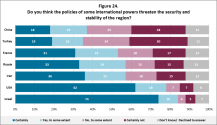Qatar was just the beginning as Middle East eyes Asian sports
This decade and beyond could be the era of Middle Eastern sports.
It may not have sunk in yet, but the Qatar World Cup was the kickoff rather than the finale.
Qatar and Saudi Arabia will be this decade’s focal points of Asian sports. By 2030, Egypt and Turkey could become part of the global sports-hosting mix.
That doesn’t mean that Arab and Berber North Africa will be sidelined. On the contrary, barely two months after emerging as a World Cup superstar, Morocco will
.
Qatar will continue hosting major sporting events, such as the
, the
, and
, which will keep the spotlight on Qatar.
.
Saudi Arabia and Egypt are considered
should they decide to bid for the tournament together with Greece.
A Moroccan pitch for the 2030 World Cup is also within the realm of possibilities.
In between, somewhat incongruously, Saudi Arabia, better known as a desert kingdom, will
in its futuristic yet-to-be-completed $500 billion city of Neom on the Red Sea.
Moreover, Saudi Arabia is also bidding for the
.
Further afar, Qatar and Saudi Arabia are separately considering bidding for the
but could join forces.
and
are mulling their separate candidacies.
Leaving aside the biased and bigoted nature of some of the discussion about the Qatar World Cup that didn’t spare Lionel Messi’s triumphal lifting of the trophy on behalf of the victorious Argentinian team because Qatari Emir Tamim bin Hamad
, the tournament fueled a long-standing debate on whether autocracies that violate human rights should be granted hosting opportunities that allow them to project themselves on the international stage in a different light.
The flurry of bids and tournaments to be hosted in the Middle East and the by and large celebratory aftermath of the Qatar World Cup proves that the criticism of the Gulf state did little to make Qatar or other regional autocracies rethink the risk of exposing themselves. At the end of the day, the World Cup achieved what the Qataris wanted.
Arab states could set a new benchmark for activists and restructure FIFA if Saudi Arabia tries for a second time to carve a new regional federation out of the world soccer body’s two largest constituent elements, the Asian Football Confederation (AFC) and the Confederation of African Football (CAF).
Sports journalist John Duerden quotes a senior AFC official predicting in 2015 during the Asian Cup in Canberra that “by the end of the next decade,
.”
Broaching the notion of an Arab split, Mr. Duerden noted that the string of tournaments hosted by Gulf states had exacerbated already strained relations between Arab and East Asian federations, including those of Japan and South Korea, that have long accounted for a significant chunk of AFC revenues.
It didn’t help that Qatar secured the rights to the 2023 Asian Cup after China had to back away from hosting the tournament because of its zero-tolerance Covid-19 policy. The Korean Football Association (KFA) responded positively to an AFC inquiry on whether it would want to replace China but suggested that Qatar made a better financial offer.
“
, such as the participation of additional sponsors by its own companies in the AFC, which is currently suffering from a loss due to COVID-19, a large-scale broadcasting rights contract with its own broadcasting company, and support for operating expenses of the Asian Cup,” the South Korean association said in a statement in October.
The KFA said the Qatari maneuver was part of an “unconventional offensive and support of Middle Eastern countries trying to take the lead in Asian football.”
The Koreans further asserted that the prospect of Saudi financial support for the AFC had secured the kingdom hosting the 2027 Asian Cup. Saudi Arabia is the only candidate after India, which the AFC also shortlisted, withdrew its bid.


